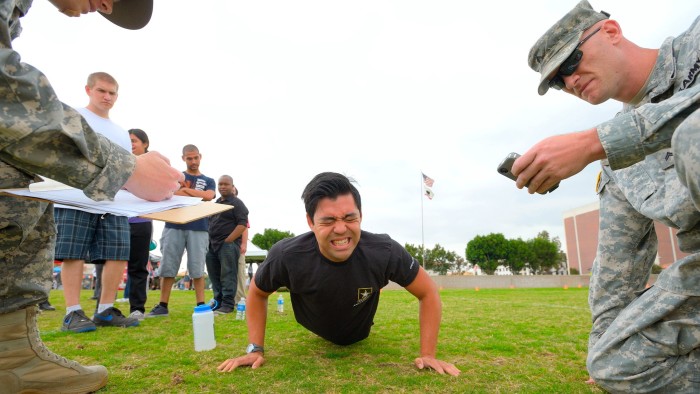Unlock the Editor’s Digest for free
Roula Khalaf, Editor of the FT, selects her favourite stories in this weekly newsletter.
The writer is a senior fellow at the Atlantic Council and advises Gallos Technologies
“Fat troops are tiring to look at,” Pete Hegseth told America’s assembled generals at a meeting in Virginia last week. Luckily for the US secretary of war, he may not have to exhaust himself. Gen Z, which makes up an increasingly significant proportion of the world’s militaries, is known for its devotion to health and fitness. This may prove a good thing, not just on a personal level, but as an opportunity for how the military and government think about protecting society.
Long before Hegseth’s remarks, western military recruiters were worrying that the lifestyle of the younger generations was becoming too sedentary for even lighter military tasks. Moreover, at a time of rising security issues, declining birth rates mean there are fewer young people and hence a smaller base for armed forces to recruit from.
Now Gen Z seems to be resolving part of the problem on its own. According to a recent survey in Europe, North America and Asia, 36 per cent of this generation exercise regularly and 50 per cent want to start doing so. They also seem keen to serve their countries; the number of applicants to Germany’s voluntary military service has increased by 15 per cent compared to last year. Finland’s Reservists’ Association has gained some 4,000 new members this year.
Some of this stems from a desire to find community. As Robert Putnam documented, we no longer bowl together like we used to. Nor do we join other clubs, and we certainly don’t participate in worship as frequently as previous generations did. As a result, 7 per cent of people in England and 13 per cent of EU residents report feeling lonely most or all of the time. Among 16- to 24-year-olds, the figure is higher.
Meanwhile, our societies are grappling with another undeniable trend: insecurity. In the past few weeks, there have been Russian drone incursions into Poland and Romania, a violation of Estonian airspace by Russian MiGs and drone disturbances at Danish and German airports. That means that military and government officials alike are having to think much more seriously about how members of society might have to help protect their countries.
Gen Z gym rats are not going to voluntarily set up auxiliary homeland protection units, nor would we want them to. Instead, governments should seize the unexpected opportunity and launch — or expand — such civil defence groups.
During the cold war, Sweden operated nationwide associations of radio operators, dog trainers, truck drivers, parachutists and much else — all in support of the armed forces. Belonging to an association was like belonging to a bowling club, but with a purpose. Volunteer defence was a national movement then, and now it’s thriving again. These associations still exist and are growing; in the first months after Russia’s invasion, the associations received as many new members as during a normal year.
Though they support the armed forces, the voluntary defence organisations have very little to do with weapons. Instead they specialise in areas ranging from radio operations to driving lorries and training dogs. Today, some 380,000 Swedes are active in such organisations, doing work that would otherwise have to be taken on by the armed forces. While some other countries have Home Guards and a smattering of volunteer groups (which these days include an Estonian cyber unit and a new Lithuanian scheme that will train 22,000 people to operate drones), no other country has matched Sweden’s.
Other nations should follow suit. Protection corps could regularly train, then deploy to support hospitals or help disable suspicious drones. During the pandemic, some 330,000 participants in the UK’s Duke of Edinburgh scheme spent 1.8mn hours volunteering. If governments teamed up with civil society to create similar new opportunities, many Gen Z-ers — eager to find community and protect their homelands — would likely heed the call.

